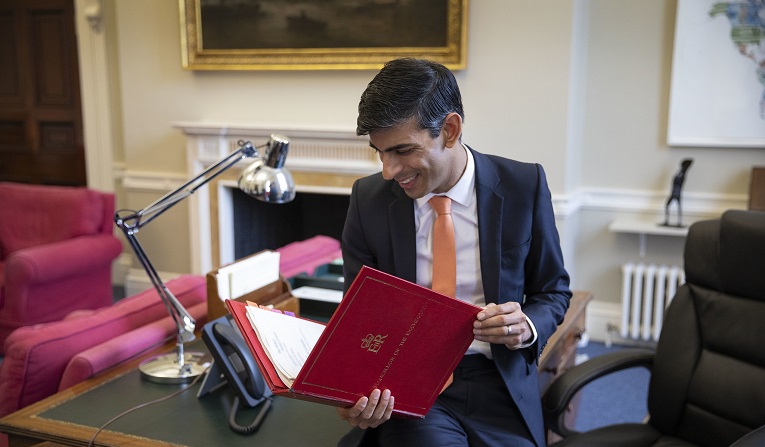Budget 2020: The small business & self-employment measures you need to know

Posted: Wed 11th Mar 2020
It was one of the most anticipated Budgets in years and, in terms of the number of announcements, Rishi Sunak's speech certainly delivered!
With the background of Brexit and the coronavirus crisis, the Chancellor announced several measures relevant to small businesses and the self-employed.
Enterprise Nation's Budget 2020 reaction
Emma Jones, founder of Enterprise Nation, said:
"This was a huge Budget and it's delightful to see small businesses back on the agenda in a positive way. Great to see the helpful moves around coronavirus, which is hitting small businesses hard in the pocket right now and this will only intensify over the next few weeks. The announcement on Statutory Sick Pay is welcome for employers and the self-employed who were worried about how to pay for days off work.
"We're pleased to see Entrepreneurs' Relief remains at £1m for Capital Gains Tax. However, we are already hearing from members who feel this will make the UK a less attractive place to start a business. Moves on business rates will be well received by the hospitality and leisure sector, as will the £3,000 cash grant to small retailers.
"Another £130m for Start Up Loans and scale-ups and we have one pro-business Budget. My only worry is - who will pay for this largesse? Is this the so-called 'Brexit war chest'?"
We've rounded up what was included in the speech and the full Budget document, which is released after the Chancellor sat down.
Coronavirus support for businesses
The Budget includes a £12bn plan to provide support for public services, individuals and businesses, whose finances are affected by COVID-19.
For businesses, the Chancellor announced:
1. Business rates
The business rates retail discount will be increased from 50% to 100% for 2020-21 and expanded to the hospitality sector.
The government says the temporary measures and existing small business rates relief (SBRR), mean that around 900,000 properties, or 45% of all properties in England, will not pay business rates in 2020-21.
The business rates discount for pubs will be temporarily increased from £1,000 to £5,000.
Businesses that pay little or no business rates through SBRR will receive £3,000 as part of £2.2bn of funding for local authorities in England.
2. Temporary coronavirus business interruption loan scheme
Delivered by the British Business Bank, the scheme includes £1.2bn in bank lending and overdrafts. The government will provide lenders with a guarantee of 80% on each loan. Businesses or banks will not be charged for the guarantee.
3. Deferral of tax payments
A dedicated helpline will be set up for those who need a deferral period on their tax liabilities. HMRC have made an extra 2,000 call handlers available to support firms.
4. Statutory Sick Pay
The government will refund Statutory Sick Pay (SSP) costs related to coronavirus for businesses employing up to 250 staff. The refund is limited to two weeks per employee.
5. Support for those ineligible for SSP
For people not eligible for SSP, such as the self-employed, the following measures were announced:
"New style" Employment and Support Allowance will be payable for people directly affected by COVID-19 or self-isolating according to government advice from the first day of sickness, rather than the eighth day.
People will be able to claim Universal Credit and access advance payments where they are directly affected by COVID-19 (or self-isolating), without the current requirement to attend a Jobcentre.
For the duration of the outbreak, the requirements of the minimum income floor in Universal Credit will be temporarily relaxed for those directly affected by COVID-19 or self-isolating according to government advice, so that self-employed claimants will be compensated for losses in income.
Entrepreneurs' Relief
Despite press reports, Entrepreneurs' Relief was not abolished but it will be reformed.
The scheme meant businesses owners paid reduced Capital Gains Tax of 10%, rather than 20%, up to a lifetime allowance of £10m (the allowance could cover the sales of multiple businesses). This will now be limited to £1m of gains.
Rishi Sunak said the relief is "expensive" at a cost of over £2bn a year, "ineffective" because less than one in 10 claimants say it was an incentive to set up a business and "unfair" as three quarters of the cost goes to only 5,000 individuals.
The document said the reforms mean "enterprising small business owners will continue to benefit, leaving over 80% of those using the relief unaffected, while making the tax system fairer and more sustainable."
Business groups, including Enterprise Nation, had met with the Chancellor and urged him not to scrap Entrepreneurs' Relief.
Funding
The Chancellor announced £130m in new funding to extend the Start Up Loans scheme to up to 10,000 more entrepreneurs between 2021 and 2022.
The Budget also provides the British Business Bank with the resources to make up to £200m of additional investment in UK venture capital and growth finance in 2020-21 to support scaling companies.
The government will convene a summit looking at what further data needs to be made accessible to make it faster and easier for small businesses to shop around for credit.
Late payment
The Budget document said the government will shortly publish a consultation on strengthening the powers of the Small Business Commissioner, who helps small businesses deal with unpaid invoices.
Several groups have pushed for the Commissioner to be able to fine big businesses that don't pay on time.
Business support
The Budget document outlined £10m in funding for England's Growth Hubs and £13m to expand the British Library's network of Business and IP Centres to 21 cities and 18 surrounding local library networks.
An additional £5m will be provided for Be the Business to expand its national business productivity campaign and develop digital tools and resources.
The Department for Business, Innovation and Skills is developing a digital service to provide businesses with tailored information about appropriate sources of support.
Self-employed
The controversial IR35 off-payroll changes are going ahead despite strong protests from freelancer groups who say they will be disastrous for the self-employed. The government argues the reforms are designed to clamp down on a tax loophole used by self-employed people working through a company. The Budget document says: "The government believes it is right to address the fundamental unfairness of the non-compliance with the existing rules, and the reform will therefore be legislated in Finance Bill 2020 and implemented on 6 April 2020."
The government will launch new "interactive online guidance" this summer to help the self-employed navigate the tax system.
The government will also explore how to improve the guidance for self-employed people applying for a mortgage and consider how to support self-employed parents, so that they can continue to run their businesses, as part of its wider review of parental pay and leave.
The Budget announced that the National Insurance contributions primary threshold and lower profits limit for the self-employed will increase to £9,500 in April 2020. The government said a typical self-employed person will save around £78 in 2020-21.
Business rates
The Budget announces the launch of "a fundamental review of business rates". It will report in the autumn.
Broadband
The Budget announced a £5bn investment in gigabit broadband rollout in the rural areas of England, Scotland, Wales and Northern Ireland.
Employment Allowance
The Employment Allowance currently gives small employers £3,000 off their National Insurance bill to encourage to take on employees. This will be increased to £4,000 which means businesses will be able to employ four full-time employees on the National Living Wage without paying any employer National Insurance contributions.
Fintech
The government will launch a review of the UK fintech sector led by Ron Kalifa OBE to support growth and competitiveness in the sector.
Get business support right to your inbox
Subscribe to our newsletter to receive business tips, learn about new funding programmes, join upcoming events, take e-learning courses, and more.
Start your business journey today
Take the first step to successfully starting and growing your business.
Join for free
